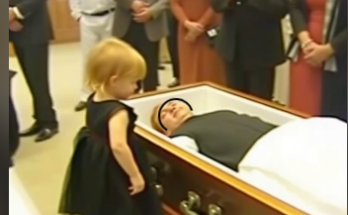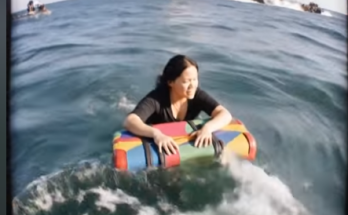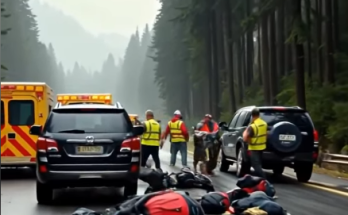Lately, I’d started visiting my father’s grave every Sunday. It brought me a quiet kind of peace to leave a small framed photo of him smiling next to his headstone—something to make the cold marble feel more like home.
But something strange kept happening.
Every time I returned, the photo would be gone.
At first, I assumed it had fallen or been damaged by weather. So I replaced it. But it vanished again. I tried a sturdier frame. Still gone. Week after week, the photo kept disappearing, even though nothing else around the grave was disturbed. It started to feel deliberate.
I couldn’t shake the feeling that someone was purposely removing it.
So one Sunday, I arrived much earlier than usual, hoping to catch whoever was behind it.
I stood at a distance, watching the path that led to my father’s grave, hidden partly behind a tall cluster of trees. The cemetery was quiet. A few visitors passed by, lost in their own moments of grief.
Then I saw her.
A woman, maybe in her 60s, walked directly to my father’s grave. She looked over her shoulder once, then bent down, removed the photo I’d placed there just days ago, and slipped it into her coat pocket like it was hers to take.
I stepped forward, heart racing. “Excuse me! What are you doing with that picture?” My voice came out sharper than I intended.
She froze.
Slowly, she stood up and turned around to face me. Her eyes were glassy, filled with something between guilt and sorrow.
She looked at the photo in her hand, then back at me.
“Your father… saved my life,” she said quietly.
I blinked, confused. “What?”
She clutched the photo against her chest like it meant something far more than I could understand. “I didn’t mean to steal it. I just… I didn’t know how to explain. I thought I could hold onto him in this small way.”
My anger dulled a bit, replaced by something closer to curiosity and disbelief. “Who are you? How did you know him?”
She hesitated, then motioned toward a nearby bench. “Please. If you have a moment… I’ll explain everything.”
I followed her, still on edge but intrigued. Once seated, she exhaled deeply, as though bracing herself.
“My name is Adriana,” she began. “Many years ago—over thirty, actually—I was going through the worst time of my life. I’d just lost my son. He was only seven. He’d drowned while on a school trip. I wasn’t even supposed to let him go, but he begged. I let him. And then he didn’t come home.”
She paused, her fingers trembling slightly.
“I couldn’t breathe after that. I felt like my heart had died with him. I lost my job. I stopped talking to friends. I pushed away my husband until he finally left. And one night… I decided I didn’t want to go on anymore.”
Her eyes found mine, hollow and honest.
“I went to the edge of the bridge near the train station. It was late. Rainy. I didn’t think anyone would notice. But someone did.”
She swallowed hard. “Your father.”
I stared at her. “My dad saved you from—?”
“Yes. He was a train conductor then. He happened to be walking home that night because his car had broken down. He saw me and didn’t hesitate. He came up quietly, didn’t startle me, didn’t judge me. He just stood beside me and said, ‘It’s okay to be broken. But don’t disappear, too.’ I didn’t want to hear it. I was angry. I screamed at him. But he didn’t leave. He stayed. For almost two hours. In the rain.”
I could picture my dad doing that. He had always been a stubborn softie, the kind of man who couldn’t walk past a hurt animal or a crying stranger.
Adriana continued. “Eventually, I climbed down. He walked me to the nearest diner and made sure I ate something. He paid for my taxi and gave me his number. Said to call anytime.”
“Did you?” I asked softly.
She smiled, a little sad. “No. I never called. But that moment changed me. I started therapy. I moved cities. Started volunteering. Every year, I try to find someone who’s struggling and sit with them, like your father did with me. It became a part of how I live.”
“And the photo?” I asked, glancing at the frame still in her lap.
She looked down. “I came here a few months ago just to visit, to say thank you. I didn’t expect to find his grave… I’d never even known his full name. But I recognized him. That photo—he looked just the same as he did that night, even after all these years.”
Her voice wavered.
“I took it… I’m sorry. I just wanted to keep him close. I guess it was selfish.”
I didn’t know what to say at first. So many emotions swirled inside me. My dad had never told us about this. But that was just like him—helping someone and never expecting anything in return.
And now, here was this woman, who had quietly honored his memory in her own way all these years.
“You could’ve just asked,” I finally said, managing a small smile. “We could’ve shared the photo.”
Adriana looked up at me, surprised, then nodded slowly. “I should have. You’re right.”
We sat in silence for a bit, the breeze rustling through the trees. Then I had an idea.
“Would you like to come back with me next Sunday? Maybe we could bring fresh flowers. I’d like to hear more stories about what you’ve done. I think my dad would’ve liked that.”
She smiled—really smiled—for the first time since we met. “I’d love that.”
From then on, Adriana and I met at my father’s grave almost every week. Sometimes we brought sandwiches and sat on the bench for hours, swapping stories. She told me about the people she’d helped over the years—an elderly man who had lost his wife, a teenager kicked out by her parents, a woman recovering from addiction. Each story was a thread in a larger tapestry of healing that my father had unknowingly helped create.
She brought out something in me, too. Talking to her made me feel closer to my dad in ways I hadn’t before. I started volunteering at a local shelter, inspired by her. I even started writing a blog about my father’s kindness, about small acts of goodness we often overlook. It gained a little following. People began sharing their own stories about strangers who had stepped in at just the right time.
And then something unexpected happened.
One evening, I received an email from someone named Raul. The subject line read: “Your father changed my life too.”
I opened it, heart pounding.
Raul wrote that he had worked with my dad briefly at the railway station years ago. One night, he’d been caught stealing food from the cafeteria. My father had found him, sat him down, and instead of reporting him, gave him half his lunch and asked what was going on. Raul was living on the streets at the time, trying to finish school and care for his younger sister.
“He didn’t make me feel like a criminal,” Raul wrote. “He made me feel human. He helped me find a job through one of his friends and even slipped me some extra cash for books. I never got to thank him. Until I saw your blog.”
The email ended with, “If there’s ever a memorial or something for him, please let me know. I want to be there.”
I cried reading that.
It turned out, Adriana wasn’t the only one.
Over the next few months, more emails trickled in. A mother whose son my dad had coached in little league, a woman whose flat tire he’d changed in the pouring rain, a young man he’d convinced to stay in school. All different people, different moments. All of them changed by one man who never told his family about any of it.
I decided to organize a small gathering at the cemetery. Just something simple. I posted the date and time on my blog.
I expected maybe ten people.
Over forty showed up.
We stood together under the afternoon sun, sharing stories, passing around photos, laughing and crying. Even some of my father’s old coworkers came. I saw people hugging. Smiling. Healing.
And there, standing quietly to the side, was Adriana. She caught my eye and placed her hand over her heart. I did the same.
In the weeks that followed, the cemetery staff allowed us to install a small bench beside my dad’s grave. We had it engraved with the words: “It’s okay to be broken. But don’t disappear, too.”
Adriana visits it often. She brings flowers not just for my father, but for others around him too. She says grief doesn’t have to be loud to be real.
One day, she brought a young girl with her. The girl looked maybe sixteen, eyes red-rimmed but hopeful. Adriana introduced her as Maria, someone she was helping. I offered her a sandwich and we sat together. Another thread in the tapestry.
My dad never sought recognition. He just believed in showing up—for strangers, for friends, for family. And in a strange, full-circle way, his quiet kindness outlived him. It echoed through people he barely knew. People like Adriana. People like me.
So now, every time I see someone sitting on that bench, I smile. Because maybe they’re hurting. Maybe they’re healing. Maybe they’re just remembering.
Either way, my father’s spirit is there. In the kindness shared. In the photo that no longer goes missing—because now, there are copies. One on the grave. One with Adriana. One in my wallet.
He saved lives in ways we’ll never fully know.
And maybe, in a small way, he’s still doing it.
Have you ever discovered something about a loved one that completely changed how you saw them?
If this story touched you, please like and share it. You never know whose life you might change with a simple act of kindness.



